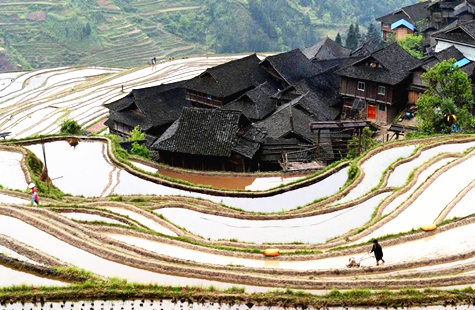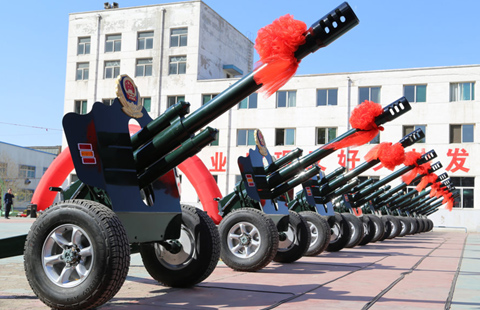Phoney icewine may leave sour taste in China
Updated: 2015-04-09 04:09
By Wang Ru(China Daily Canada)
|
||||||||
Canadian wine producers and exporters eyeing the growing market in China have warned buyers to beware counterfeit icewine.
Wineries and importers from around the world attended the 92nd China Food, Wine and Spirits Trade Fair — also known as the Chengdu Wine Fair — in the Sichuan provincial capital at the end of March.
Officials from the Canadian embassy and Canadian consulate in Chongqing also took part to promote their nation's products, including icewine, a sweet dessert wine that is made from grapes that have been frozen while still attached to the vine.
"Canadian wine producers hope to promote their brands and educate Chinese consumers to distinguish from counterfeit icewine, which is harming to the brand's image," said Philippe Rheault, the Canadian consul to Chongqing.
An estimated 1.94 billion bottles of wine were consumed in China last year, roughly 1.43 bottles per capita, and the market has great growth potential.
Canada's total global wine exports in 2013 were C$54.4 million ($43.5 million), with icewine accounting for about one-third, according to figures provided by the embassy. China is the second-largest market for Canadian wine, but it is the No 1 buyer of the country's icewine. Last year it imported 72,422 liters of icewine, worth C$6.6 million.
Between 2008 and 2013, exports of Canadian wine increased in value by 168 percent and in volume by 437 percent. The top wine export markets, in terms of value, are the United States, China, Hong Kong, Russia and South Korea.
Due to the industry's relatively small size and capacity, Canada's vintners are aiming at a handful of priority markets, such as China – especially Beijing, Shanghai and Hong Kong.
However, the problem of fake icewine has escalated worldwide, and particularly in China. A thriving counterfeit industry is drowning the Chinese market with cheap imitation products, made by diluting white wine and adding a sweetener, such as honey.
"The presence of these products not only costs Canadian vintners financially but also risks consumer confusion and loyalty. These wines also pose health and safety risks," said Li Yuan, a representative of Magnotta Winery, based in Ontario.
Gu Wansan, a Canadian icewine importer from Shanghai, agreed and added: "It's very discouraging to see counterfeit icewine being sold in China. Consumers buy what they think is authentic icewine and then are disappointed with what they buy."
Strict regulations exist to ensure the authenticity of genuine icewine: Grapes must be kept on the vine until harvest, they must be harvested at temperatures below -8 C, and must be harvested and pressed in a continuous process while they remain naturally frozen.
To stop the spread of fake icewines, the Canadian Vintners' Association has been working to define icewine in federal law as a wine exclusively made from grapes naturally frozen on the vine. The goal is to enhance Canada's reputation and brand for quality, as well as facilitate consumer protection and the trade of icewine both in Canada and around the world.
In 2012, Canada's world-famous icewine producer Inniskillin, also based in Ontario, estimated that about one-third of icewine products available in Asian markets were counterfeit.
wangru@chinadaily.com.cn
- Bird flu outbreaks reported in two Mexican states
- Failed developer shoots dead 3, injuries 2 at Milan courthouse
- People rescue beached dolphins in Japan
- Indonesian children's risky shortcut to get to school
- S.Korea, US to hold joint exercises
- Last batch of Chinese peacekeeping infantry arrives in S.Sudan

 Chinese farmers plough their lands for spring
Chinese farmers plough their lands for spring
 Tibetans' viral wedding photos contrast city with country life
Tibetans' viral wedding photos contrast city with country life
 Across America over the week (from April 3 to 9)
Across America over the week (from April 3 to 9)
 Battling the language barrier
Battling the language barrier
 Ten photos you don't wanna miss of today
Ten photos you don't wanna miss of today
 Amur tigers come back from the brink
Amur tigers come back from the brink
 Guns prepared to mark Anti-Fascist War anniversary
Guns prepared to mark Anti-Fascist War anniversary
 Tibetans' viral wedding photos contrast city with country life
Tibetans' viral wedding photos contrast city with country life
Most Viewed
Editor's Picks

|

|

|

|

|

|
Today's Top News
Consulate general praises C-100 on 25th anniversary
Celebrating a relationship
US, Cuba hold highest-level talks since 1961
Chinese police return favor for
ill US officer
Battling the language barrier
UN official praises new website that engages Chinese public
Hillary Clinton expected to announce presidential run soon
Shooting outside Washington DC leaves 1 injured
US Weekly

|

|






